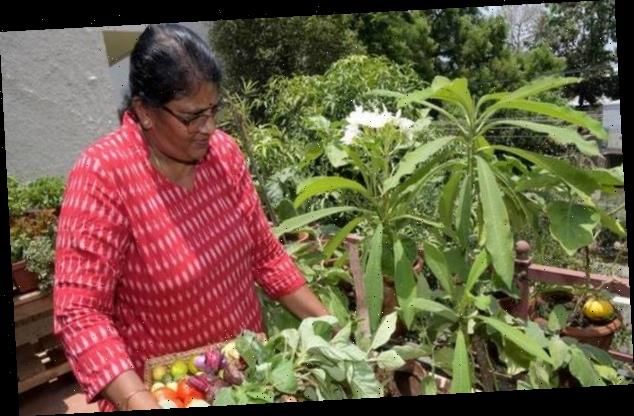Growing your own vegetables not only ensures fresh food, but also helps calm the mind
Getting fresh vegetables is becoming more and more difficult. You are probably left to choose between droopy spinach and overripe tomatoes by the time you get to a shop. There is another way, says Shanthni Balu, a landscaping consultant from Coimbatore. “This is the perfect time to start a vegetable garden. The number of enquiries asking for tips to start gardening has increased after the lockdown. I think it is a good hobby to pick up in these difficult times as it helps calm our mind and also keeps us occupied.” She has tended to her kitchen garden for more than 30 years now. and grows tomato, brinjal, bitter gourd, cauliflower, cabbage, mangoes, ridge gourd, chilli, and 70 varieties of greens.
Compost at home!
- Take a bucket with a lid and drill holes on the sides and the lid for aeration
- Layer the bottom with soil.
- Add vegetable and fruit peels, wilted flowers, egg shells, tea and coffee grounds to the bucket over the layer of soil. Avoid bones and dairy products.
- Mix the contents once a week to promote microbial growth. Every now and then, add an inch or so of soil to it.
- Continue the process till the bucket is full
- Remember to keep it away from direct sunlight.
- At the end of 60 days, the compost should be ready
“It may not be possible to source seeds due to the lockdown. But we can still grow many plants with things that we can find in our kitchen,” says Shanthni. “Microgreens are rich in nutrition. Put a handful of mustard, fenugreek, ragi, groundnut or horse gram into the soil and add enough water before adding a thin layer of top soil. It will sprout in the next two days. Once they have their first set of leaves, it is ready to be harvested. Cut them at soil level with a pair of sharp scissors and this can be added to your sandwich, salad or soup,” she says.
Alageshwari S, an organic farming activist from Uthukuli, grows cucumber, lady’s finger, keerai, tomatoes and cluster beans in her garden. She says all one needs is interest to set up a garden. “It is easy. The first step is to prepare the soil. I recommend mixing the soil with compost and cow dung before filling it in pots or grow bags that should be placed on bricks or planks to ensure there is sufficient aeration,” she says.
Alageshwari S
| Photo Credit:
Special Arrangement
After the seeds are planted, cover the soil with leaves. “This process is called mulching. It helps the microbes grow and also helps to retain the water in the soil,” she explains. Grow your greens or keerai from fenugreek, thatta payaru, pacha payaru or horse gram, she says. “Soak the seeds overnight and plant them in the soil. Once they are about half a feet high, they can be harvested and used in a poriyal or gravy.”Alageshwari has been setting up organic kitchen gardens for homes and educational institutions for the past 10 years.
Don’t throw, grow!
- Recycle overripe, rotting vegetables you may hesitate to cook and eat.
- If you have sprouted shallots, simply plant the bulb ( It could take two to three months for the harvest).
- If there are any overripe tomatoes in your fridge, squash them gently and and put them into the soil. Once the seedlings are half feet in height, replant them individually into grow bags. Chillies can also be grown the same way.
- For coriander laves, press the coriander seeds gently between your hands to break the pod before planting them in the soil.
- The leftover stem of mint can be used to regrow it. It might take 20 days to harvest.
- If ginger is sprouting, cut the portion with the nodes and plant it. It is best to plant it in river soil. Before you do, air-dry the ginger for a day to reduce moisture as otherwise it can rot inside the soil
Once the seeds are planted ensure that it gets enough water and sunlight to grow. “Before watering, touch the soil to see if it is dry. Over watering can lead to the plant rotting. It is best to water it before 7:00 am and after 5:00 pm,” Alageshwari advises. And to protect the plants from pests, add some charcoal or wheat flour to the soil. “It works especially for maavu poochi, which is a common pest. One can also sprinkle neem oil solution. To 10 ml of neem oil, add 10 ml of hot water. Once cool, add 30 ml of buttermilk and 950 ml of water. Use this as needed and you are good to go,” she explains.
Source: Read Full Article

